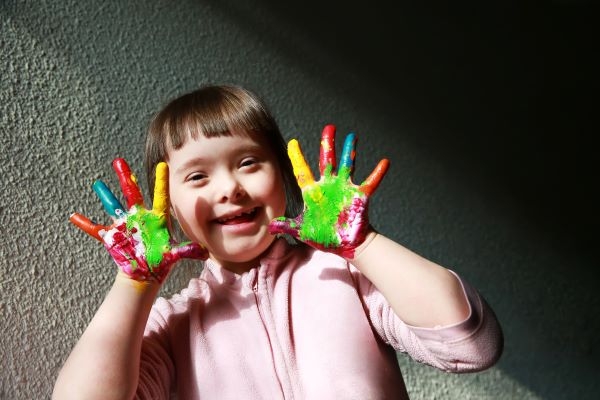Becoming Great Parents with Down Syndrome Child

People with special needs, such as Down syndrome, sometimes get unpleasant treatment. However, a cafe in Jakarta Selatan shows its appreciation by hiring them. Cleaning tables, preparing coffee, to serving it to customers. According to Kompas, the children had already received training from Rumah Ceria Down Syndrome (RCDS).
Down syndrome is a genetic condition that occurs when someone has an extra copy of chromosome 21. Normally, humans have 46 chromosomes divided into 23 pairs.
However, people with Down syndrome have 47 chromosomes, which impacts their physical, intellectual, and health development.
According to global data, one in every 700 babies is born with Down syndrome, regardless of race, socioeconomic background, or environmental variables. This condition occurs purely due to genetic factors and has nothing to do with parenting or lifestyle.
Down syndrome diagnosis

Down syndrome can be diagnosed in two ways:
1. Prenatal diagnosis (before birth)
Several examinations can be used to make a diagnosis, including nuchal translucency ultrasound (NT test), blood testing, and amniocentesis or chorionic villus sampling (CVS).
This examination is quite accurate in detecting extra chromosomes but has a small risk, such as miscarriage, so genetic counseling is highly recommended.
2. Postnatal diagnosis
Doctors can recognize the physical features of Down syndrome and confirm the diagnosis with a chromosome test (karyotype).
Receiving a diagnosis can be an emotionally overwhelming experience for families. Therefore, psychological and community support are essential to help parents cope with this challenge.
Physical and developmental findings of Down syndrome
Symptoms of Down syndrome might vary. However, some common features include:
- low muscle tone (hypotonia) and motor delays;
- short stature;
- upward-slanting eyes and a small nose;
- a single crease in the palm (simian crease);
- intellectual disabilities of varying severity;
- delayed language development;
- prone to congenital heart disease, hearing loss, and vision problems.
Challenges of parenting a child with Down syndrome

Every family may react differently to having a family member with Down syndrome. Some may experience shock, sadness, or anxiety. Others may be calm and accepting of the situation.
Read more: Be the Toughest Support for Your Down Syndrome Child.
All of these responses are normal. However, it is critical that families to quickly move on, manage their emotions, and make informed decisions for the care and well-being of their child.
The first thing to understand is that every child with Down syndrome has unique physical and emotional needs.
However, they do share some basic needs, including:
- recognized as unique individuals;
- loved and fully accepted;
- treated equally with their siblings;
- have access to education and recreational activities.
Raising a kid with Down syndrome can be challenging for both parents and caregivers due to their unique characteristics. For example,
1. Developmental delays
Children with Down syndrome generally experience delays in speaking, walking, and social interaction. Therefore, they require additional support, such as speech, physical, and occupational therapy, to support their development.
This therapy activity aims to develop important skills, such as communication, building social relationships, and self-care abilities. The earlier therapy begins, the greater the child's chances of developing optimally.
Children with Down syndrome are lifelong learners. They just need special resources and support to guide their learning.
They may experience behavioral and mental health problems, such as anxiety, depression, autism, and attention deficit/hyperactivity disorder (ADHD).
2. Health problems
Children with Down syndrome are more susceptible to various medical conditions, such as congenital heart defects, hearing and vision disorders, and are susceptible to infections.
Eye exams help determine if glasses are needed; hearing exams can determine the need for hearing aids.
Children with Down syndrome may have trouble digesting certain foods. They are at higher risk than other children for celiac disease. This makes it difficult for them to digest gluten, a common ingredient found in wheat, barley, and rye. They also have a higher risk of gum disease and slow-growing teeth.
Therefore, parents must routinely monitor their children's health through medical examinations, both for early detection and appropriate treatment of emerging health problems.
Preventive care and health monitoring need to be carried out continuously to maintain the quality of life of children.
However, they have pleasant personalities, such as being cheerful, loving, and empathetic.
3. Social stigma
Although public awareness of Down syndrome is increasing, stigma and discrimination are still felt by many families.
This can have an impact on children's self-esteem and the emotional well-being of parents. As a result, it is critical to fight for children's rights and educate the public about inclusion and acceptance.
Joining a support group, such as a group for parents of children with Down syndrome, or attending community events, can also be a source of motivation and strength in dealing with everyday challenges.
Down syndrome is not the end of the world. With the right medical, educational, and social support, children with Down syndrome can grow into happy, loving, and contributing members of society.
Education and acceptance from the community are also vital in creating an inclusive and welcoming environment for them.



